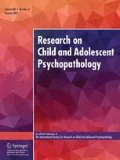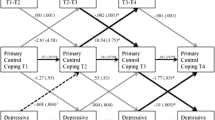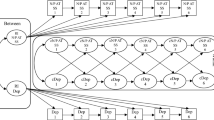Abstract
We studied developmental changes in the relation between cognitive style (i.e., attributional style and cognitive errors) and depression in children. Subjects included 409 fourth-, sixth-, and eighth-grade school children. We hypothesized (1) that evidence congruent with a cognitive diathesis model of depression would emerge with development across middle childhood, (2) that Event × Cognitive Style × Age interactions would be specific to some domains of stressful events but not others, and (3) that interactions would be especially prominent in domains that children regarded as personally important. Hierarchical multiple regressions indicated that cognitive style moderated the relation between events and self-reported depressive symptoms only in later childhood, and that such interactions were specific to certain domains of stressful events and cognitions. The importance of distinguishing among types of stress and cognitions in future tests of diathesis-stress models of childhood depression are discussed. Implications of developmental differences in the psychopathology of child depression also emerge.
Similar content being viewed by others
References
Abramson, L. Y., Alloy, L. B., & Metalsky, G. I. (1988). The cognitive diathesis-stress theories of depression: Toward an adequate evaluation of the theories' validities. In L. B. Alloy (Ed.),Cognitive processes in depression (pp. 3–30). New York: Guilford Press.
Abramson, L. Y., Metalsky, G. I., & Alloy, L. B. (1989). Hopelessness depression: A theory-based subtype of depression.Psychological Review, 96, 358–372.
Abramson, L. Y., Seligman, M. E. P., & Teasdale, J. D. (1978). Learned helplessness in humans: Critique and reformulation.Journal of Abnormal Psychology, 87, 49–74.
Anderson, C. A., Arnoult, L. H., & Jennings, D. L. (1988). Validity and utility of the attributional style construct at a moderate level of specificity.Journal of Personality and Social Psychology, 55, 979–990.
Beck, A. T. (1987). Cognitive models of depression.Journal of Cognitive Psychotherapy, 1, 5–38.
Brown, G. W., & Harris, T. O. (1986). Establishing causal links: The Bedford College studies of depression. In H. Katschnig (Ed.),Life events and psychiatric disorders: Controversial issues (pp. 107–187). Cambridge, England: Cambridge University Press.
Cole, D. A. (1989).A competency-based model of child depression. Unpublished manuscript.
Cole, D. A., & Turner, J. E. (1993). Models of cognitive mediation and moderation in child depression.Journal of Abnormal Psychology, 102, 271–281.
Compas, B. E. (1987). Stress and life events during childhood and adolescence.Clinical Psychology Review, 7, 275–302.
Cutrona, C. E., Russell, D., & Jones, R. D. (1985). Cross-situational consistency in causal attributions: Does attributional style exist?Journal of Personality and Social Psychology, 47, 1043–1058.
Dixon, J. F., & Ahrens, A. H. (1992). Stress and attributional style as predictors of self-reported depression in children.Cognitive Therapy and Research, 16, 623–634.
Dweck, C. S., & Elliott, E. S. (1983). Achievement motivation. In P. H. Mussen (Series Ed.) & E. M. Heatherington (Vol. Ed.),Handbook of child psychology (4th ed., Vol. 4, pp. 643–691). New York: Wiley.
Dweck, C. S., & Leggett, E. L. (1988). A social-cognitive approach to motivation and personality.Psychological Review, 95, 256–273.
Finch, A. J., Saylor, C. F., & Edwards, G. L. (1985). Children's Depression Inventory: Sex and grade norms for normal children.Journal of Consulting ad Clinical Psychology, 53, 424–425.
Fincham, F. D., & Cain, K. M. (1986). Learned helplessness in humans: A developmental analysis.Developmental Review, 6, 301–333.
Hammen, C., Adrian, C., & Hiroto, D. (1988). A longitudinal test of the attributional vulnerability model in children at risk for depression.British Journal of Clinical Psychology, 27, 37–46.
Kaslow, N. J., Rehm, L. P., Pollack, S. L., & Siegel, A. W. (1988). Attributional style and self-control behavior in depressed and nondepressed children and their parents.Journal of Abnormal Child Psychology, 16, 163–175.
Kaslow, N. J., Rehm, L. P., & Siegel, A. W. (1984). Social-cognitive and cognitive correlates of depression in children.Journal of Abnormal Child Psychology, 12, 605–620.
Kaslow, N. J., Tanenbaum, R. L., & Seligman, M. E. P. (1978).The KASTAN-R: A children's attributional style questionnaire, (KASTAN-R—CASQ). Unpublished manuscript, University of Pennsylvania.
Kazdin, A. E. (1990). Childhood depression.Journal of Child Psychology and Psychiatry, 31, 121–160.
Kendall, P. C., & Watson, L. (Eds.). (1989).Anxiety and depression: Distinctive and overlapping features. New York: Academic Press.
Kovacs, M. (1983).The Children's Depression Inventory: A self-rated depression scale for school-aged youngsters. Unpublished manuscript, University of Pittsburgh.
Leitenberg, H., Yost, L. W., & Carroll-Wilson, M. (1986). Negative cognitive errors in children: Questionnaire development, normative data, and comparisons between children with and without self-reported symptoms of depression, low self-esteem, and evaluation anxiety.Journal of Consulting and Clinical Psychology, 54, 528–536.
Metalsky, G. I., Abramson, L. Y., Seligman, M. E. P., Semmel, A., & Person, C. (1982). Attributional styles and life events in the classroom: Vulnerability and invulnerability to depressive mood reactions.Journal of Personality and Social Psychology, 43, 612–617.
Miller, A. T. (1985). A developmental study of the cognitive basis of performance impairment after failure.Journal of Personality and Social Psychology, 49, 529–538.
Monroe, S. M., & Simons, A. D. (1991). Diathesis-stress theories in the context of life stress research: Implications for the depressive disorders.Psychological Bulletin, 110, 406–425.
Nelson, W. M., Politano, P. M., Finch, A. J., Wendel, N., & Mayhall, C. (1987). Children's Depression Inventory: Normative data and utility with emotionally disturbed children.Journal of the American Academy of Child and Adolescent Psychiatry, 26, 43–48.
Nicholls, J. G. (1978). The development of the concepts of effort and ability, perception of academic attainment, and the understanding that difficult tasks require more ability.Child Development, 49, 800–814.
Nicholls, J. G. (1990). What is ability and why are we mindful of it? A Developmental Perspective. In R. J. Sternberg and J. Kolligian, Jr. (Eds.),Competence considered. Yale University Press: New Haven.
Nicholls, J. G., & Miller, A. (1984). Reasoning about the ability of self and others: A developmental study.Child Development, 55, 1990–1999.
Nolen-Hoeksema, S., Seligman, M. E. P., & Girgus, J. S. (1986). Learned helplessness in children: A longitudinal study of depression, achievement, and explanatory style.Journal of Personality and Social Psychology, 51, 435–442.
Person, C., & Seligman, M. E. P. (1984). Causal explanations as a risk factor for depression: Theory and evidence.Psychological Review, 91, 347–374.
Rholes, W. S., Blackwell, J., Jordan, C., & Walters, C. (1980). A developmental study of learned helplessness.Developmental Psychology, 16, 616–624.
Robins, C. J., & Block, P. (1988). Personal vulnerability, life events, and depressive symptoms: A test of a specific interactional model.Journal of Personality and Social Psychology, 54, 847–852.
Robins, C. J., & Hinkley, K. (1989). Social-cognitive processing and depressive symptoms in children: A comparison of measures.Journal of Abnormal Child Psychology, 17, 29–36.
Rutter, M. (1981). Stress, coping, and development: Some issues and some questions.Journal of Child Psychology and Psychiatry, 22, 323–366.
Seligman, M. E. P., & Person, C. (1986). A learned helplessness perspective on childhood depression: Theory and research. In M. Rutter, C. E. Izard, & P. B. Read (Eds.),Depression in young people: Developmental and clinical perspectives (pp. 223–249). New York: Guilford Press.
Seligman, M. E. P., Peterson, C., Kaslow, N. J., Tanenbaum, R. L., Alloy, L. B., & Abramson, L. Y. (1984). Attributional style and depressive symptoms among children.Journal of Abnormal Psychology, 93, 235–238.
Shelton, M. R., & Garber, J. (1987).The Children's Activity Inventory. Unpublished manuscript, Vanderbilt University.
Smucker, M. R., Craighead, W. E., Craighead, L. W., & Green, B. J. (1986). Normative and reliability data for the Children's Depression Inventory.Journal of Abnormal Child Psychology, 4, 25–39.
Watson, D., & Clark, L. (1984). Negative affectivity: The disposition to experience aversive emotional states.Psychological Bulletin, 96, 465–490.
Author information
Authors and Affiliations
Rights and permissions
About this article
Cite this article
Turner, J.E., Cole, D.A. Developmental differences in cognitive diatheses for child depression. J Abnorm Child Psychol 22, 15–32 (1994). https://doi.org/10.1007/BF02169254
Revised:
Issue Date:
DOI: https://doi.org/10.1007/BF02169254




